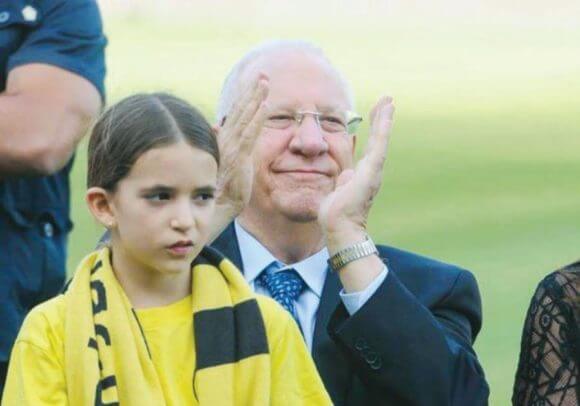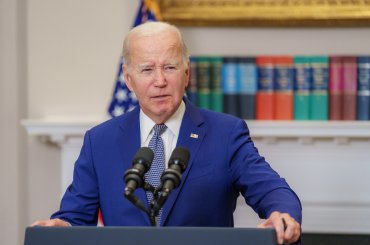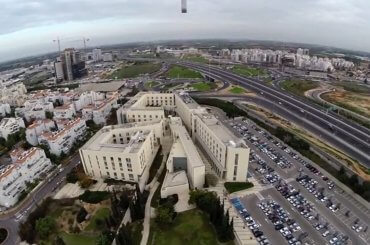The football club Beitar Jerusalem continues to capture the increasingly extreme right-wing tendency of Israel’s current discourse. Indeed, the domination of Beitar’s fascistic fanbase, rampaging soccer hooligans known as La Familia, along with their racist sidekicks in Lehava, finally pushed its more liberal fans to the limit. By the summer of 2014, they founded Beitar Nordia as a way of preserving what they thought to be the uncorrupted spirit of their former club.
This was after the horrifying events following the short-lived 2013 signings by Beitar Jerusalem management of two Chechen Muslims Zaur Sadayev and Djebrail Kadiyev; an end, in the eyes of many, to a long period of underhanded appeasement and denial on the part of those who didn’t want to face what had happened to the old Beitar.
Beitar Nordia has already made a name for itself through lectures at schools across Israel where they are spreading their message of co-existence, or in the words of Nordia’s chairman Itsek Alfasi: “We aim to provide a voice to the silent majority who oppose La Familia, and football is a very powerful tool for this.” Nordia sees itself as an ambassador of the true, liberal spirit of Israelis, but is under no illusions over the need to overcome very different, dangerous visions of the country.
I spoke to one of the new club’s international spokesmen, Daniel Rotem. We discussed why Nordia was founded and his own experience of racism in Israel and in Beitar Jerusalem. In the past, saying you were a Beitar Jerusalem fan was a source of pride, but Rotem says that “7 or 9 years ago” it changed to people tagging you as part of the “extreme right-wing” and “Arab-hating”. Rotem confirmed how much damage was done to the club’s reputation but vehemently disagreed such perceptions represented the majority of the fanbase.
Though whether he felt safe walking into Beitar Jerusalem’s home, Teddy Stadium, was a separate story. Rotem assured me that Beitar’s support numbered in the hundreds of thousands while La Familia constituted maybe 5000. On the other hand “people knew his face,” and if he went to certain stands he probably wouldn’t leave “the same way I came in” and the fact he said this with a chuckle really hit home how normal this threat level had become for progressive activists.
Then he added something of a silver lining, “In essence, that’s why we started Beitar Nordia,” continuing, “I’m not going to risk a life in a fight with anyone.”
Rotem and like-minded others stopped trying to change things from the inside, with their proto-Nordia organisations that had failed to end the racist incitement Beitar Jerusalem fans wanted to escape.
The ongoing, racist saga of La Familia and Beitar Jerusalem should come as no surprise to observers of the Israeli-Palestinian conflict. Especially in the UK after the well-received BBC showing of Forever Pure: Football and Racism in Jerusalem last December.
The documentary led to a barrage of death threats for its director, Maya Zinshstein. She revealed, as if it were common knowledge in Israel, “All our leaders are fans.” Despite the support Zinshstein’s mission enjoyed from Israeli president Reuven Rivlin and the Israeli-Arab footballing legend Rifaat Turk, who’s long called for Beitar’s suspension, she was putting a spotlight on a team that criminally-suspect Russian billionaire-turned-football magnate Arcadi Gaydamak had purchased largely to underpin his bid to become mayor of Jerusalem.

The complicity of Israel’s ruling class with the anti-Arab, Islamophobic bigotry of Beitar’s fanbase has real consequences, as the recent paltry sentence of Elor Azaria shows; Israeli Defense Minister Avigdor Lieberman fought shoulder-to-shoulder with the likes of Likud Member of Knesset Oren Hazan and La Familia itself for the pardon of a man who it turns out will only spend 18 months in prison for cold blooded murder.
And yet, even Lieberman is a traitor from the view of Teddy’s east stand. When he celebrated Zaur Sadayev’s first goal for the club, the first ever by a Muslim player on the team, Beitar hardliners a few rows in front rounded on him, shouting: “Where are your principles? Where are your policies now?”
What soon followed was one of the largest sports boycotts in Israeli history; a significant portion of Beitar Jerusalem’s base refused to attend any more of their matches until Muslims were no longer allowed to play.
La Familia wanted to remake Beitar Jerusalem in their own image, and they did win, eventually, but not before burning down their own team’s memorabilia and 80 years of history. Behind La Familia’s racist campaign lay a trail of bodies too – Beitar’s former captain and goalkeeper Ariel Harush hounded out by La Familia, and transferred to its old rival Hapoel Tel Aviv, the team’s former chairman Itzik Kornfein left under the weight of death threats to him and his family (yelled at by illegal demonstrators outside his house, footage of which can be seen on YouTube). And even coach Eli Cohen was fired, Haaretz reported, as a “direct result of pressure from La Familia extremists”.
Rotem believes Beitar Jerusalem used to represent “those who have less”, and it is this solidarity with the underdog that prolonged the fight against those who wanted to take his club the opposite direction to Nordia’s.
There have been causes for hope. In the coordinated police raids last July, 56 people associated with La Familia were arrested. Even so, according to Rotem, a “minority [La Familia] had taken over the club”, and while Rotem admitted he and other Nordia activists had considered the possibility of returning in the event of a complete turnaround, unsurprisingly they thought this almost impossible by this point.
When asked if he thought racism had gotten worse in Israeli football and society as a whole in conjunction with the worsening situation in Beitar Jerusalem, Rotem said that the hatred on both sides was escalating and this was forcing the Israeli people to realize that the conflict had to be drawn to an end. And, while “there is no easy solution,” it might be solved if everyone was willing to make “painful” sacrifices. But both sides would gain much more than they lose from peace, and although Jerusalem remains a divided city Rotem believes Jerusalemites of east and west are beginning to see eye to eye.
Rotem also believes that the Israel Football Association (IFA) has not taken responsibility for what’s happening to Beitar Jerusalem, but claimed the former chairman Itzik Kornfein was on “the verge of cleaning it up”. He thinks they’ve “pushed La Familia’s 50 or so leaders into a corner”. According to Rotem, when Gaydamak sold the club to Eli Tabib, the new owner saw the racists as his clients, people not worth upsetting. So, “if you want to place immediate blame, it’s definitely Tabib”.
As the interview came to a close, I broached the more sensitive topic of the one-state solution and its perceived inevitability in some circles. Rotem said that his vision, which may seem like a dream, was an Israel where everyone could live “equal and full lives”.
Perhaps it would have been best if it ended there, because in his reply to a question about the status of settler teams and settler players he then said something quite troubling, namely that discrimination against settlers by Israelis was illegal and this also applied to football. There, our agreement came to an end. It is the precedent recently re-established by FIFA when it banned the Crimean football teams that became a part of Russia after the peninsula’s annexation that supporters of justice in Israel-Palestine should cite. FIFA rules prohibit member associations holding competitions on the territory of another without permission. At least in the Crimea case, FIFA actually applied its rules; doing so in the West Bank would mean disqualifying Israeli teams from competition, something they’ve thus far refused to do.
Currently, there are six Israeli teams playing in illegal settlements in the West Bank. Earlier this month, a wide coalition of Palestinian and international organisations denounced FIFA’s failure to compel the IFA to exclude those settlement teams and called for the dissolution of FIFA’s Israel-Palestine monitoring committee.
Ben Jamal, director of the UK Palestine Solidarity Campaign, addressed a question posed to FIFA’s monitoring committee last autumn in an article for the Guardian: Why should the settlements not be treated as the international community claims to see them, as illegal entities?
Beitar Jerusalem hired Kobi Moyal, born in the illegal West Bank settlement of Ma’ale Adumim, so is it truly any less bigoted than the six fully-fledged settlement clubs? Or any more bigoted or culpable for the hateful ideology fueling the occupation than the other clubs hiring these settler players? We should be boycotting these too, until Israel dismantles the settler infrastructure or gives all Palestinians their rights and their vote. Or boycott every single Israeli club, if they’re all prohibited from discriminating against settlers. The very fact we can ask whether these paths of action have become necessary shows, frankly, how far out of the Israeli Football Association’s control this situation has gone. A democratic one-state, or democratic two-states, but apartheid, never.
Just as Israel’s loyal friendship with Trumpian America appears to have escalated, moving even further away from justice, perhaps those striving to hold them to account should escalate as well.



israeli “progressives” , how futile.
Britain Nordia=too little too late
The Beitar Jerusalem fans “la familia” mafiastic behaviors are already chronicled in the news and video forever alive on YouTube. These people already have the flea bites covering their ankles. There’s no rebranding this dung pile.
The sad reality is that Israel itself is “la familia” based on a racist ideology. So how can you expect it to not infiltrate organizations such as sports which are inherently nationalistic in nature? Sports are very much an embodiment of the “us vs them” ethos.